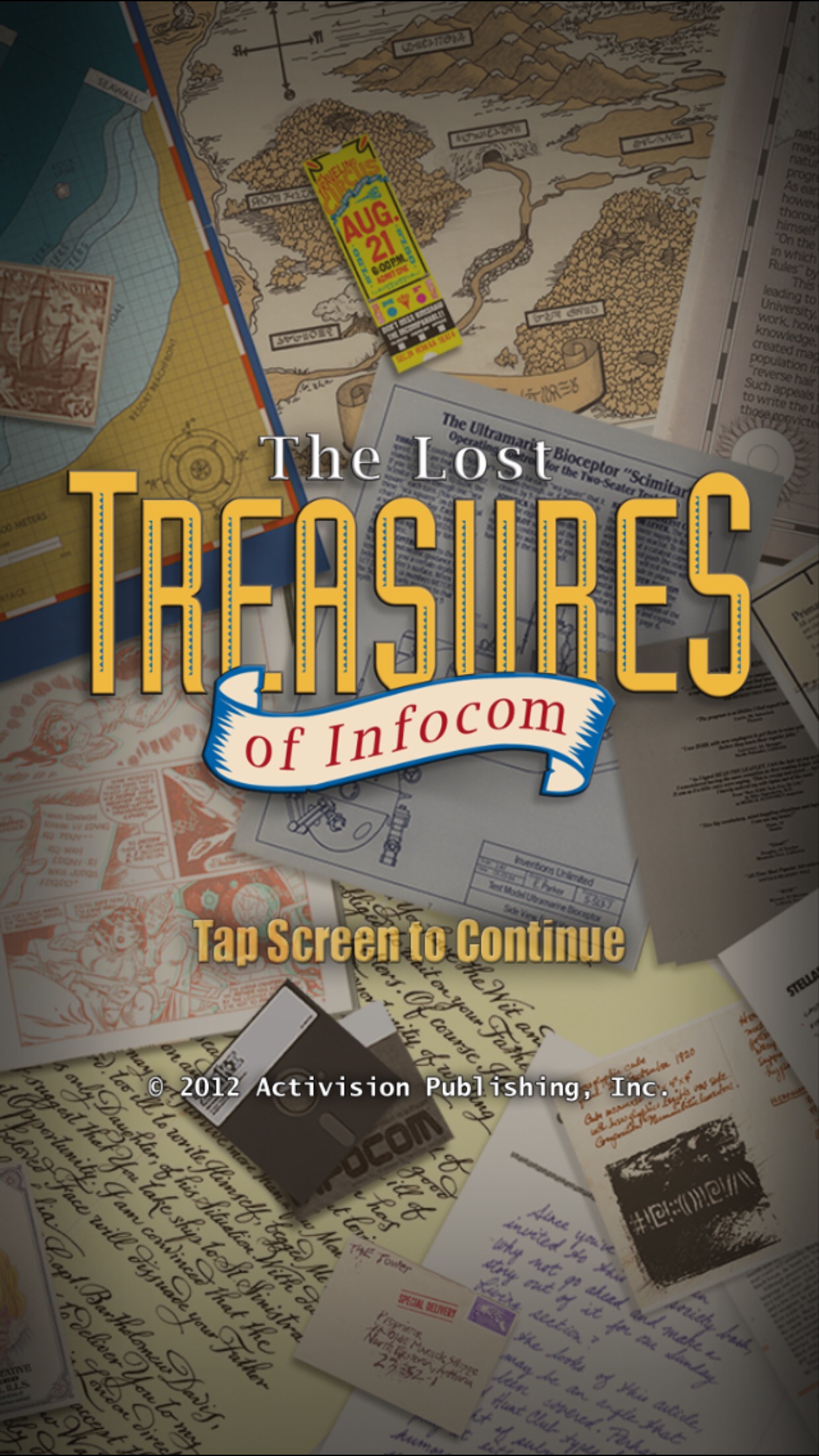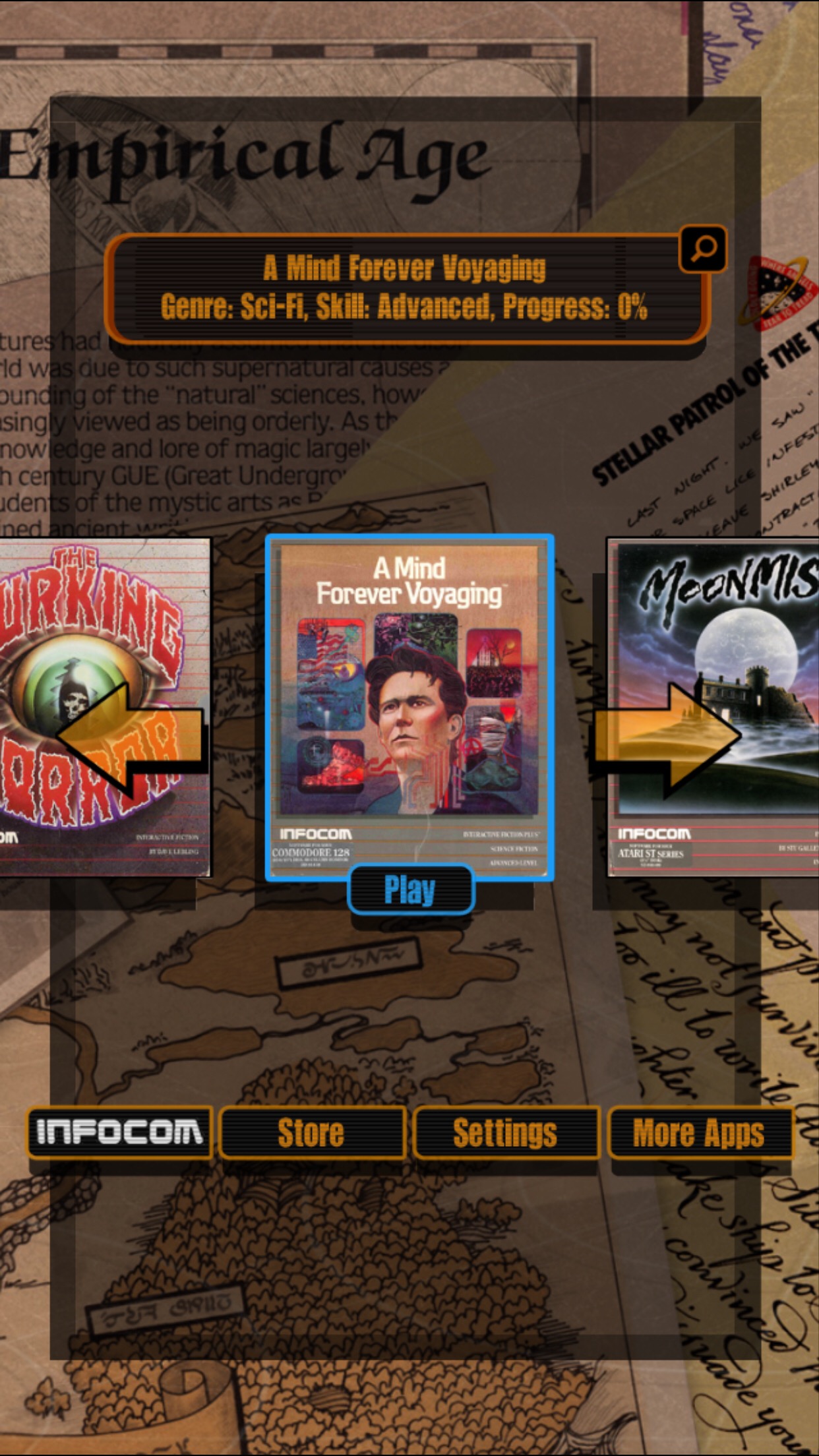![]() Hello, gentle readers, and welcome to the Classic Reload, the regular feature where our minds are forever voyaging. In each installment, we take a look at a game from the App Store’s past to see how it’s holding up in the here and now. It’s a chance to revisit old favorites, reflect on their place in the overall library, or simply to take a deeper dive than our reviews typically allow. As the one most likely to be eaten by a grue, I try to choose a balanced selection of games to feature. If you feel like something cool is missing, please let me know. You can leave suggestions in the comments below. I can’t promise we’ll get to any suggested games soon, but they will be added to the master list for future consideration.
Hello, gentle readers, and welcome to the Classic Reload, the regular feature where our minds are forever voyaging. In each installment, we take a look at a game from the App Store’s past to see how it’s holding up in the here and now. It’s a chance to revisit old favorites, reflect on their place in the overall library, or simply to take a deeper dive than our reviews typically allow. As the one most likely to be eaten by a grue, I try to choose a balanced selection of games to feature. If you feel like something cool is missing, please let me know. You can leave suggestions in the comments below. I can’t promise we’ll get to any suggested games soon, but they will be added to the master list for future consideration.
Warning: This week’s featured game is a 32-bit app, and there are no indications that its publisher plans to update it for 64-bit compatibility. Therefore, it very well may not work on your device from iOS 11 onward. You have been warned.
Apple’s decision to end support for 32-bit apps has put me in a bit of a tricky position with regards to the Reload and my planned schedule. The most obvious effect of the situation is that I’m moving up some games that I had planned on doing down the road. Activision’s Lost Treasures of Infocom (Free) presents a different issue. Originally, I was going to take on certain games included in this wonderful bundle in individual articles. Many of them surely deserve it. But with the clock ticking on the arrival of iOS 11 and the likely disappearance of this important app, I’ve decided to dedicate an article talking about the whole ball of wax at once.
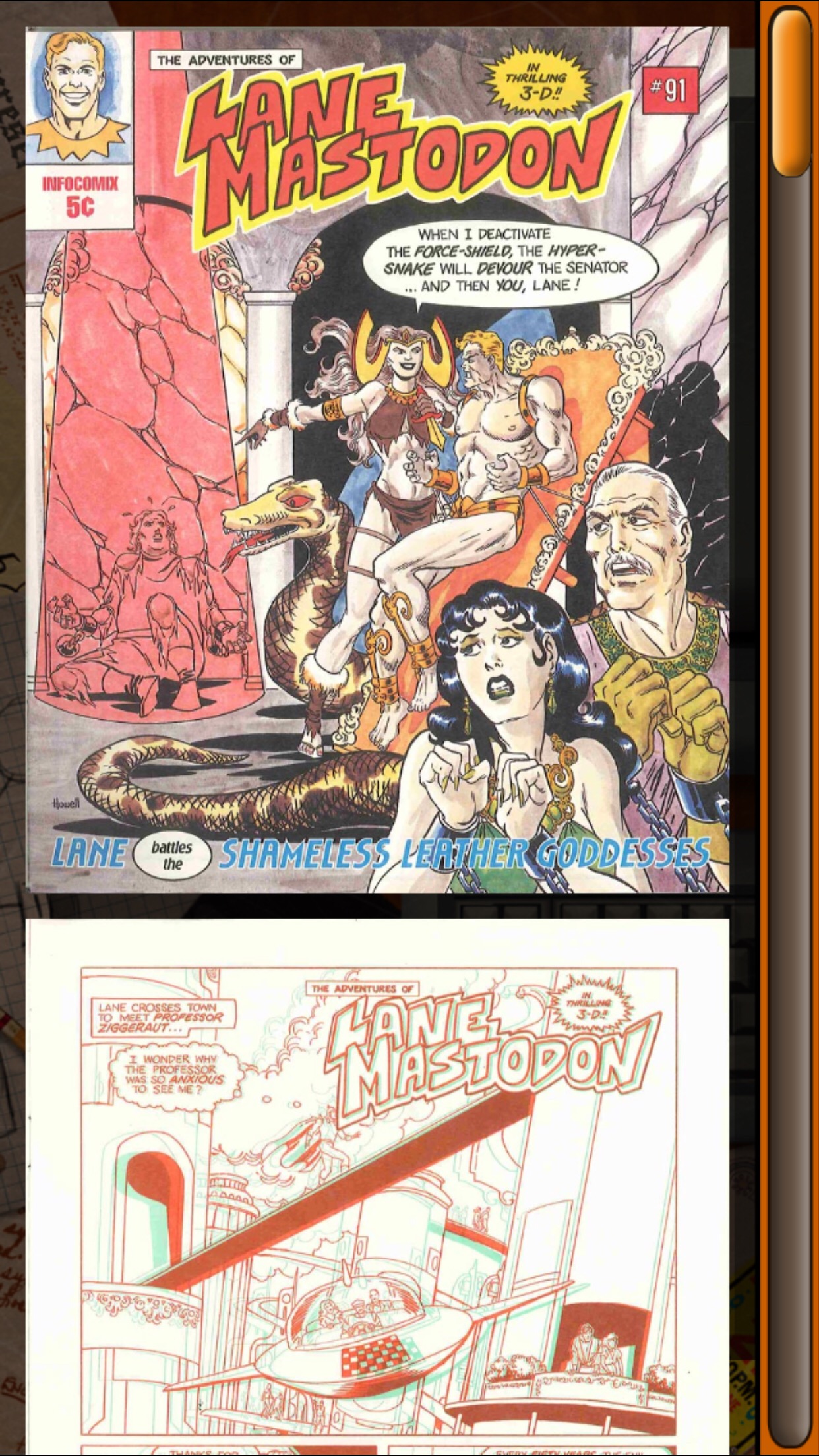 Since this feature tends to appeal to the, er, more experienced demographic, I know that plenty of you remember the days where the most popular games were little more than text on a screen. If you have memories of wrestling with text parsers, beating a game by typing things that would come out of the Hulk’s mouth, and game boxes full of glorious extra bits and bobs that actually added to the game experience instead of mere cat helmets, you surely know Infocom. Founded in 1979 by a group of MIT staff and students, Infocom shot to fame on the back of their Colossal Cave-inspired adventure game Zork. Following that game’s release in 1980, Infocom would release at least a few games every year leading up to their closure in 1989. They employed a number of different authors, a task made easier by their in-house programming language, ZIL. Their games were designed to be easily ported to a variety of platforms by using a sort of virtual machine wrapper, which was frankly an amazing idea for the time.
Since this feature tends to appeal to the, er, more experienced demographic, I know that plenty of you remember the days where the most popular games were little more than text on a screen. If you have memories of wrestling with text parsers, beating a game by typing things that would come out of the Hulk’s mouth, and game boxes full of glorious extra bits and bobs that actually added to the game experience instead of mere cat helmets, you surely know Infocom. Founded in 1979 by a group of MIT staff and students, Infocom shot to fame on the back of their Colossal Cave-inspired adventure game Zork. Following that game’s release in 1980, Infocom would release at least a few games every year leading up to their closure in 1989. They employed a number of different authors, a task made easier by their in-house programming language, ZIL. Their games were designed to be easily ported to a variety of platforms by using a sort of virtual machine wrapper, which was frankly an amazing idea for the time.
Although they released a small number of games with graphics, their main strengths came through their text adventure games which they coined ‘interactive fiction’. The flexibility of the format allowed the publisher to handle a wide variety of themes and tones, from the ribald and humorous Leather Goddesses of Phobos to the pensive and philosophical A Mind Forever Voyaging. They even produced a couple of licensed games, most notably the excellent adaptation of The Hitchhiker’s Guide to the Galaxy by Douglas Adams. Unfortunately, the market for text adventures began to evaporate as computers became more powerful and capable. Some of Infocom’s peers were able to make a successful jump into graphic adventures, but Infocom stayed the course perhaps a little too long. In 1986, they were acquired by Activision. Three years of butting heads later, Infocom became nothing more than a label occasionally trotted out to sell some vaguely adventure-like things.
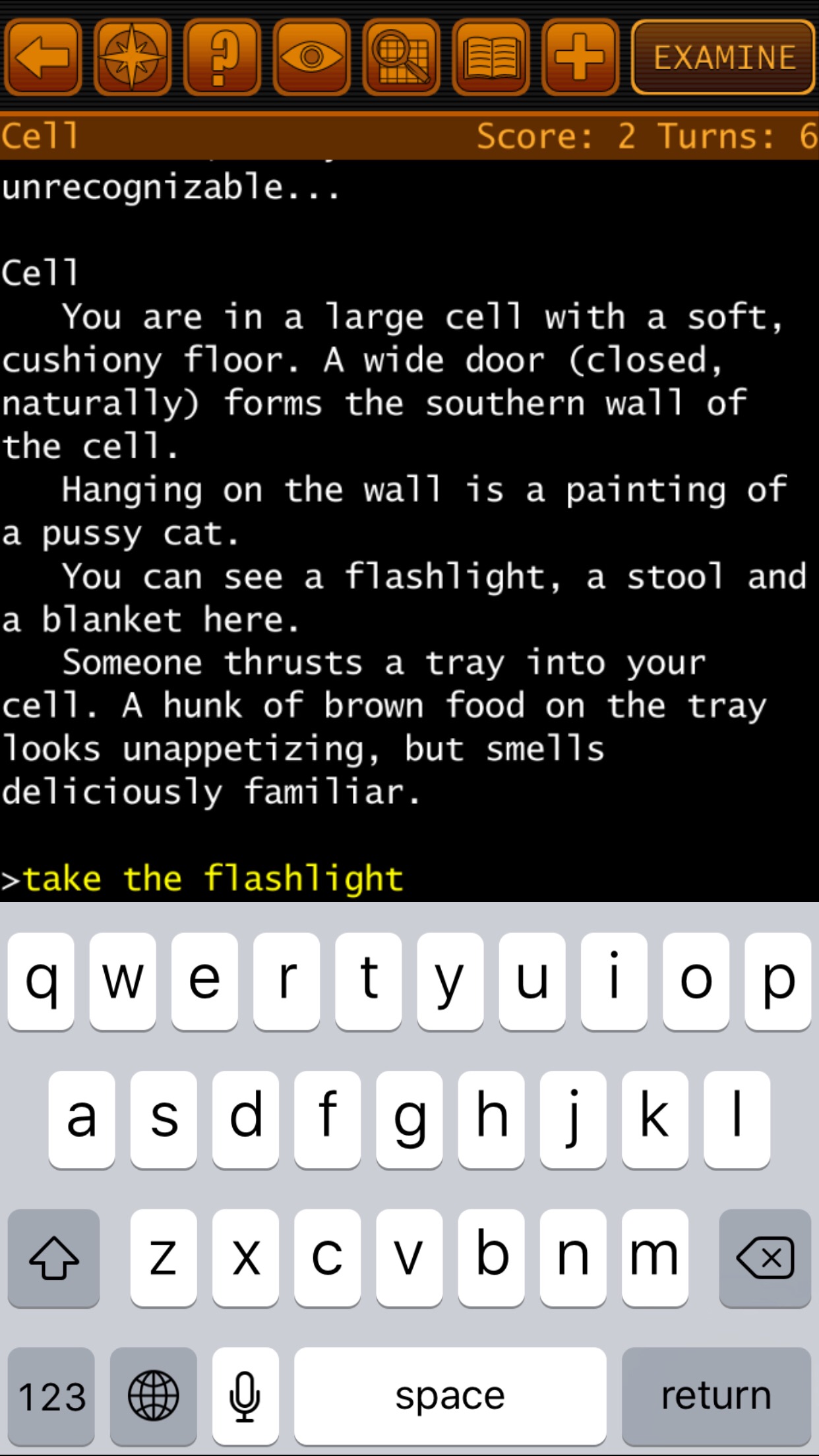 There were lots of reasons why Infocom’s games were considered top-of-class in what was once a very busy genre. The quality of the writing was an obvious one, but there were plenty of good writers at other companies. Another strength is that Infocom’s text parser ran circles around the competition. While you could still type short verb-noun style sentences to play the games, Infocom’s parser was uncannily good at recognizing real English and somewhat complicated sentences. Then there was the packaging. In an era where you were lucky to get a box instead of a resealable bag of disks, Infocom was delivering their games with the packaging equivalent of a gold brick. Boxes adorned with gorgeous artwork containing plump, informative manuals were just the start. Each game would also include some of Infocom’s famous ‘feelies’, small objects or items that would help bring the experience alive. Bits of fluff, scratch and sniff cards, train tickets, code wheels, telegrams, maps, buttons, and more could be found among these treats.
There were lots of reasons why Infocom’s games were considered top-of-class in what was once a very busy genre. The quality of the writing was an obvious one, but there were plenty of good writers at other companies. Another strength is that Infocom’s text parser ran circles around the competition. While you could still type short verb-noun style sentences to play the games, Infocom’s parser was uncannily good at recognizing real English and somewhat complicated sentences. Then there was the packaging. In an era where you were lucky to get a box instead of a resealable bag of disks, Infocom was delivering their games with the packaging equivalent of a gold brick. Boxes adorned with gorgeous artwork containing plump, informative manuals were just the start. Each game would also include some of Infocom’s famous ‘feelies’, small objects or items that would help bring the experience alive. Bits of fluff, scratch and sniff cards, train tickets, code wheels, telegrams, maps, buttons, and more could be found among these treats.
Activision still holds the rights to most of the Infocom library and has released collections of their classic games here and there over the years. The first such collection was in 1991, including 20 games. The most complete collection came in 1996 with the release of Classic Text Adventure Masterpieces of Infocom, which included all but two of Infocom’s core 35 releases. Unfortunately, that was also one of the last times Activision would make the non-Zork Infocom games available for purchase. Fans would have to wait more than 15 years for their next chance, and when it arrived, it did so on a piece of hardware that didn’t even have a physical keyboard. Lost Treasures of Infocom released on iOS in 2012, collecting 26 Infocom text adventures from the 1980s along with the 1997 throwback Zork: The Undiscovered Underground. The base download is free and includes the original Zork. Additional games are available a la carte or via various bundle packs.
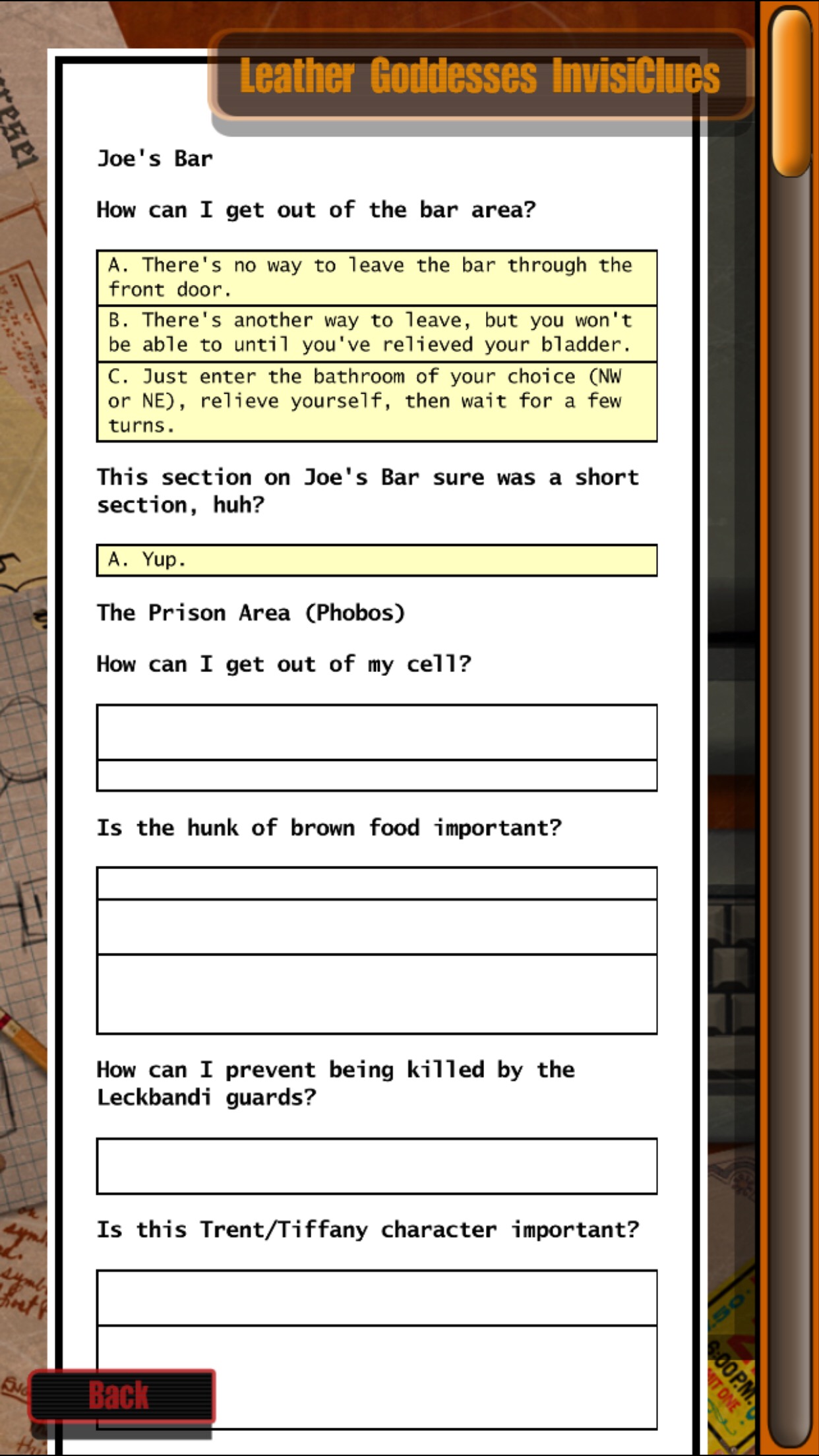 Yes, it is somewhat cumbersome to play games that were originally fully controlled with a keyboard if you don’t have an actual physical keyboard. But the team in charge of developing this collection, Vancouver-based Code Mystics, really did their best to mitigate that issue. There are lots of touch-based shortcuts that you can customize, auto-complete options on words you’ve encountered, an undo feature, and more. You’ll still have to do some typing on the software keyboard, but considering the generally terse nature of text adventures, it probably adds up to less than the average person’s social media output in a day. Aside from their excellent job with the interface, Code Mystics also went all-out on the extras. Each game includes its original documentation and replicas of its ‘feelies’, often via 3D polygonal models that you can rotate around and examine at your leisure. It’s about as good as you can get short of actually having the original physical packaging.
Yes, it is somewhat cumbersome to play games that were originally fully controlled with a keyboard if you don’t have an actual physical keyboard. But the team in charge of developing this collection, Vancouver-based Code Mystics, really did their best to mitigate that issue. There are lots of touch-based shortcuts that you can customize, auto-complete options on words you’ve encountered, an undo feature, and more. You’ll still have to do some typing on the software keyboard, but considering the generally terse nature of text adventures, it probably adds up to less than the average person’s social media output in a day. Aside from their excellent job with the interface, Code Mystics also went all-out on the extras. Each game includes its original documentation and replicas of its ‘feelies’, often via 3D polygonal models that you can rotate around and examine at your leisure. It’s about as good as you can get short of actually having the original physical packaging.
The app also includes additional IAPs to unlock maps and Invisi-clues for all of the games. Having access to the former greatly curbs the difficulty of many of the games, but the nature of mobile gaming is such that you probably won’t be able to draw your own maps, so it’s something of a necessary evil. Invisi-clues were actual hint booklets that you would turn to if all else failed. Difficult problems were listed, along with one or more clues that could only be seen if you traced over them with a special pen. They’re basically the same here, revealed by swiping your finger. Just like the real ones, you can’t cover them back up again once you’ve revealed them, so only turn to them if you’re genuinely stumped. You can see a sample of how both of these features work in Zork 1 without paying any additional money.
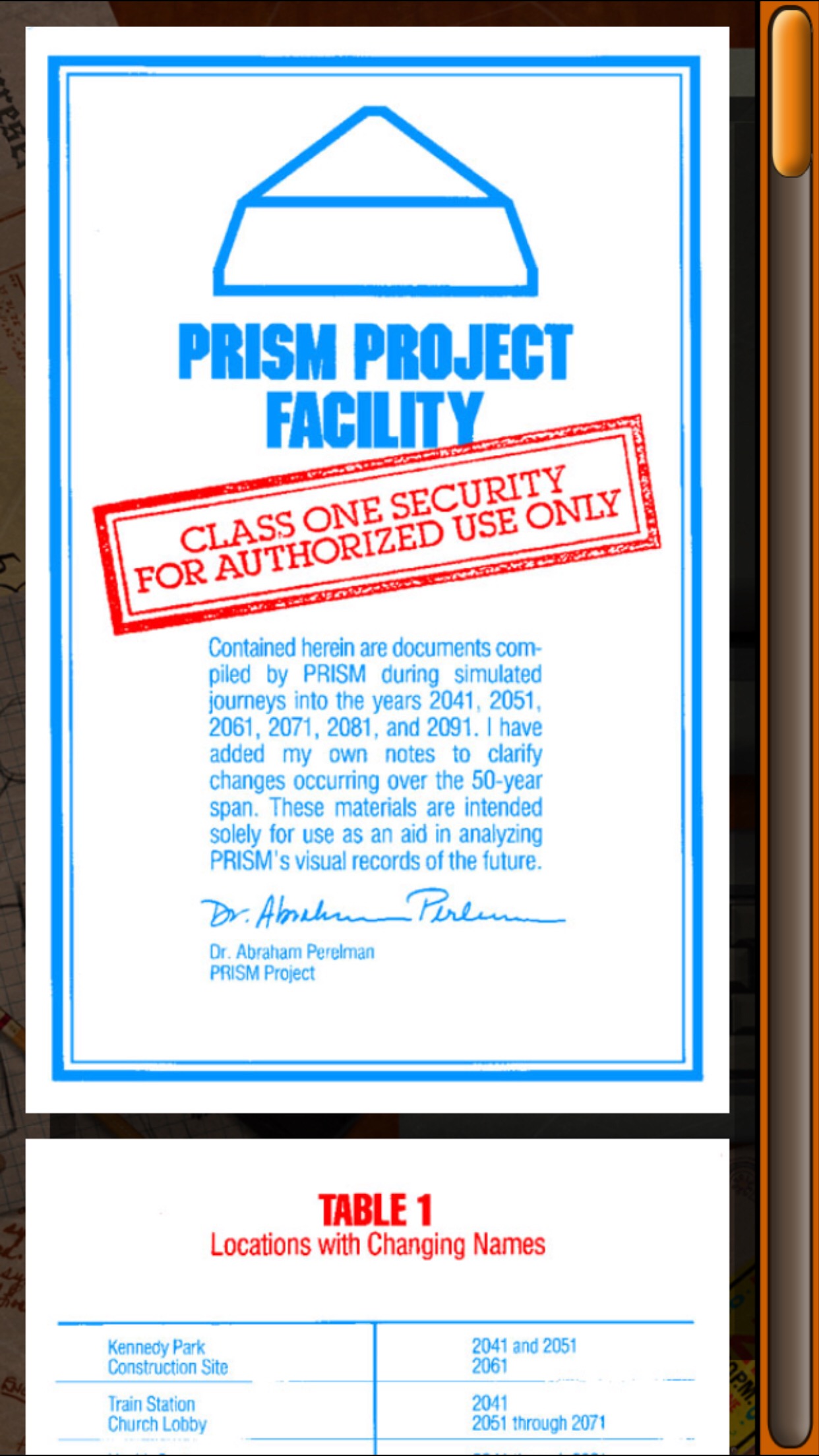 Sure, there are walkthroughs and FAQs for all of these games on the internet, mere taps away at any time. But I think you’ll get the greatest appreciation for these games if you come at them in the context that the Code Mystics are so desperately trying to recreate here. Nearly everything you need to beat these games can be found somewhere in the app, though you might have to pay for the extra hints and maps if you can’t puzzle things out on your own. That’s how it worked then, too. Now, I’ll grant that it’s an easier go with some of the included games than with others. The Zork games have always been a little too opaque, and I believe Suspect is the game that requires you to be in certain places at certain times, a process that can be maddening.
Sure, there are walkthroughs and FAQs for all of these games on the internet, mere taps away at any time. But I think you’ll get the greatest appreciation for these games if you come at them in the context that the Code Mystics are so desperately trying to recreate here. Nearly everything you need to beat these games can be found somewhere in the app, though you might have to pay for the extra hints and maps if you can’t puzzle things out on your own. That’s how it worked then, too. Now, I’ll grant that it’s an easier go with some of the included games than with others. The Zork games have always been a little too opaque, and I believe Suspect is the game that requires you to be in certain places at certain times, a process that can be maddening.
I guess while we’re on that note, I should give some recommendations about which games to check out. The easy answer is that you should pick up all of them. At $9.99 for the bundle, you’re paying less than 50 cents per game. But I can appreciate that some may not want or need 27 text adventures, so I’m going to give a few personal thoughts on what I feel are the best of the bunch.
The best game you can pick up in this app is, in my opinion, A Mind Forever Voyaging. Designed by Steve Meretzky, this is a 1985 release that goes exceptionally light on puzzles in favor of telling a well-written, deeply political story about what the author saw as the end result of 1980s American policy. It doesn’t fully click the way the author might have hoped, but there are some genuinely poignant moments in this game. You play as PRISM, the world’s first sentient computer. You’re tasked with the job of simulating the results of a plan put forth by a Senator to see how it will turn out. You’ll hop through various points in time, observing how even carefully-laid plans can go completely awry.
 Another outstanding game is Trinity. This one was designed by Brian Moriarty, who would go on to work at Lucasarts on Loom and The Dig. Trinity was originally released in 1986. Like A Mind Forever Voyaging, this is a bit of a solemn story that tackles another major concern of the period: nuclear weapons. You play as a person who finds themselves in London right as a Soviet nuclear missile is about to strike. Fate intervenes, and your character escapes to a bizarre limbo of sorts with doorways that lead to particular points in history. Many consider Trinity to be one of the most significant adventure games in history, so it’s definitely worth putting on your shopping list.
Another outstanding game is Trinity. This one was designed by Brian Moriarty, who would go on to work at Lucasarts on Loom and The Dig. Trinity was originally released in 1986. Like A Mind Forever Voyaging, this is a bit of a solemn story that tackles another major concern of the period: nuclear weapons. You play as a person who finds themselves in London right as a Soviet nuclear missile is about to strike. Fate intervenes, and your character escapes to a bizarre limbo of sorts with doorways that lead to particular points in history. Many consider Trinity to be one of the most significant adventure games in history, so it’s definitely worth putting on your shopping list.
If you want something a bit lighter as far as real-world issues go, I can’t recommend Planetfall enough. Originally released in 1983, this was Steve Meretzky’s first game at Infocom. It’s a sci-fi story that sees you playing as a low-ranking officer on a starship. Circumstances lead to you taking an escape pod to a nearby planet. You need to figure out how to get back home, and soon. What makes this one really memorable is the presence of your robot sidekick, Floyd. He adds so much personality and humor to the game, and if you manage to see your way through to the game’s conclusion, I can promise that you will never, ever forget Floyd. Text adventures tend to feel very lonely at times, but Planetfall avoids that with style.
Many of the games I tend to suggest are strong for story reasons, but Suspended is also quite interesting from a gameplay point of view. Written by Michael Berlyn and released in 193, it describes a weird future where Earth has colonized a planet called Contra. The planet’s vital systems are controlled by a human mind, essentially used as a processor while the human sleeps unaware in cryogenic stasis. Your character is the human in question for the next 500 years, but a problem arises pretty quickly. A major earthquake wakes you up and causes the planet’s systems to go haywire. That’s bad enough, but the people of the planet assume everything is going badly because you’ve gone rogue. You need to set things right before they come and disconnect your brain, killing you. Of course, you are still immobile, so you need to rely in a team of robots with various abilities. Depending on the robot you’re using, you’ll get very different descriptions of each room and area. Very cool.
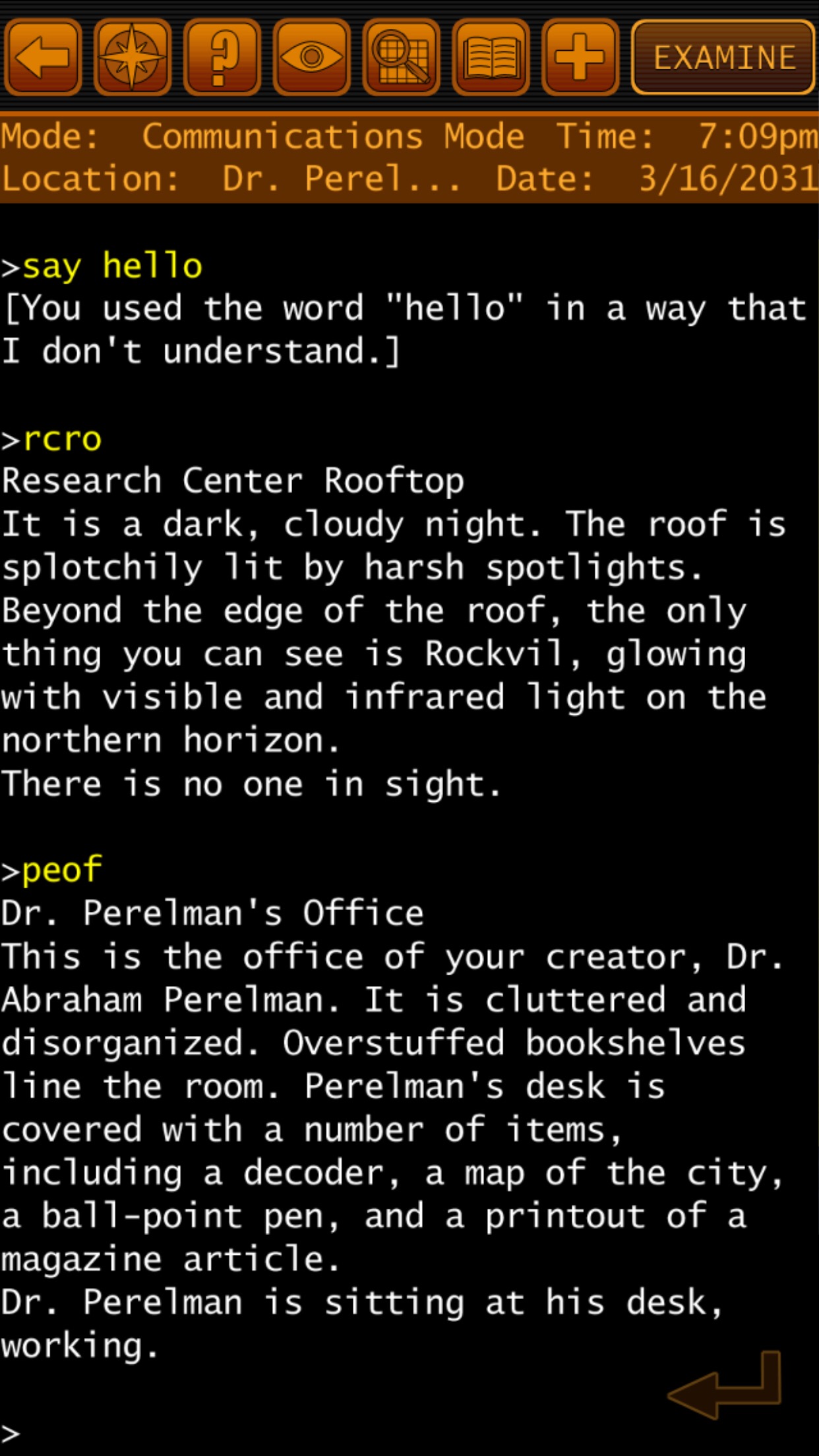 There’s also the somewhat famous Leather Goddesses of Phobos. Another Steve Meretsky game, this one released in 1986, Leather Goddesses of Phobos is sometimes left out of Infocom collections due to its penchant for raunchiness. It’s a lot like Flash Gordon, but perhaps a little more like Flesh Gordon, if we’re being honest. The story goes that the titular Goddesses are planning an invasion of Earth. They kidnap your character to do some final testing before they attack. You escape and soon realize you are the only one who can stop their wicked plan of turning Earth into their own private pleasure dome. You can actually choose from a few naughtiness settings, with tame excising much of the adult content, lewd going into full detail, and suggestive landing somewhere in between. As long as you don’t mind its often low-brow nature, Leather Goddesses of Phobos is a hilarious good time. Everything is deliberately cranked over the top, giving the whole thing the feel of an absurd B-movie. I think it’s pretty great.
There’s also the somewhat famous Leather Goddesses of Phobos. Another Steve Meretsky game, this one released in 1986, Leather Goddesses of Phobos is sometimes left out of Infocom collections due to its penchant for raunchiness. It’s a lot like Flash Gordon, but perhaps a little more like Flesh Gordon, if we’re being honest. The story goes that the titular Goddesses are planning an invasion of Earth. They kidnap your character to do some final testing before they attack. You escape and soon realize you are the only one who can stop their wicked plan of turning Earth into their own private pleasure dome. You can actually choose from a few naughtiness settings, with tame excising much of the adult content, lewd going into full detail, and suggestive landing somewhere in between. As long as you don’t mind its often low-brow nature, Leather Goddesses of Phobos is a hilarious good time. Everything is deliberately cranked over the top, giving the whole thing the feel of an absurd B-movie. I think it’s pretty great.
I’ll give my final strong recommendation to The Lurking Horror. Designed by Dave Lebling, this 1987 release is Infocom’s only true horror game. Drawing heavily on Lovecraftian themes, The Lurking Horror is a genuinely scary game that has you trapped by a heavy snowstorm in a largely-deserted university campus inspired by MIT. While you’re really just trying to finish a report at the start, things start unraveling pretty quickly. You’ll soon be up to your neck in creatures that seem to have crawled out of the mouth of Hell itself. How can you escape? Can you even escape? This one is really tense, friends, and one prone to stir anyone with a powerful imagination.
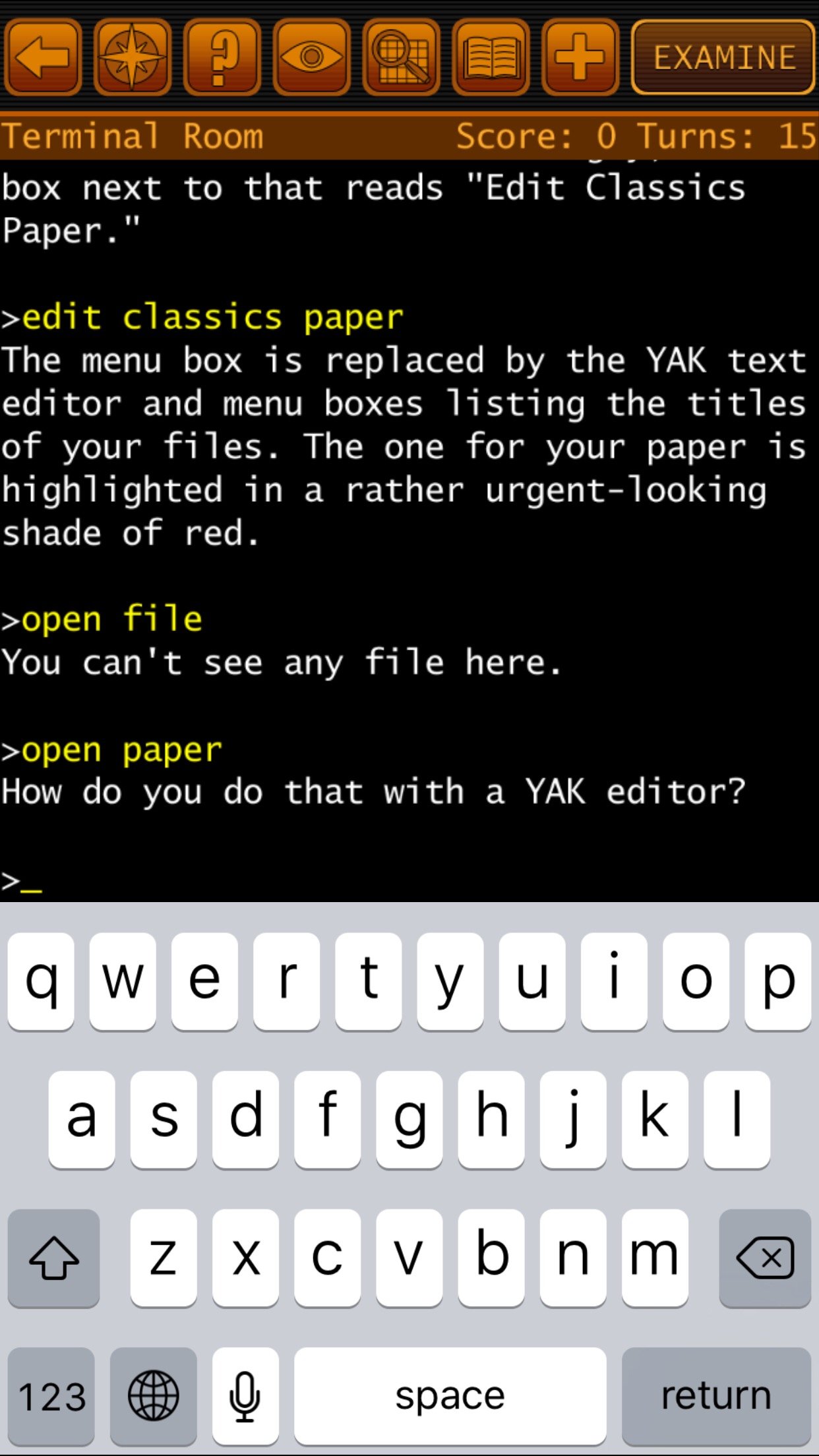 Despite how precious and important Lost Treasures of Infocom is, it seems to be doomed by the upcoming 32-bit app cull coming with iOS 11. The game runs just fine, with no issues even on the latest version of iOS. That might explain why it hasn’t been updated in more than three years, but it doesn’t leave me with much confidence that Activision is going to save it. Having so many important classics presented in such fine form makes this an essential app, so I sure hope I’m wrong about that. If you choose to buy it, keep in mind that you’re going to be doing a fair bit of typing. I think the iPad version is better because of that, but your mileage may vary. Either way, it’s never too late to enjoy some of the finest genre-defining work from a legendary developer that has long since passed into the ether.
Despite how precious and important Lost Treasures of Infocom is, it seems to be doomed by the upcoming 32-bit app cull coming with iOS 11. The game runs just fine, with no issues even on the latest version of iOS. That might explain why it hasn’t been updated in more than three years, but it doesn’t leave me with much confidence that Activision is going to save it. Having so many important classics presented in such fine form makes this an essential app, so I sure hope I’m wrong about that. If you choose to buy it, keep in mind that you’re going to be doing a fair bit of typing. I think the iPad version is better because of that, but your mileage may vary. Either way, it’s never too late to enjoy some of the finest genre-defining work from a legendary developer that has long since passed into the ether.
That’s just my take on Lost Treasures of Infocom, though. What do you all think? Please share your Infocom-related thoughts below. It doesn’t even have to specifically be about the iOS versions. Any grand old memories of these great adventures will do. Also, don’t forget to join in on the RPG Reload Play-Along of Final Fantasy 5 that is taking place in our forums. The Four Job Fiesta is in full swing, and many of our players are just getting started in earnest. I’ve chosen to extend this Play-Along for a second month, so there’s still plenty of time to join in. As for me, I’ll be back next week with an RPG Reload File. Thanks for reading!
Next Week’s Reload: Anodyne Mobile ($4.99)
